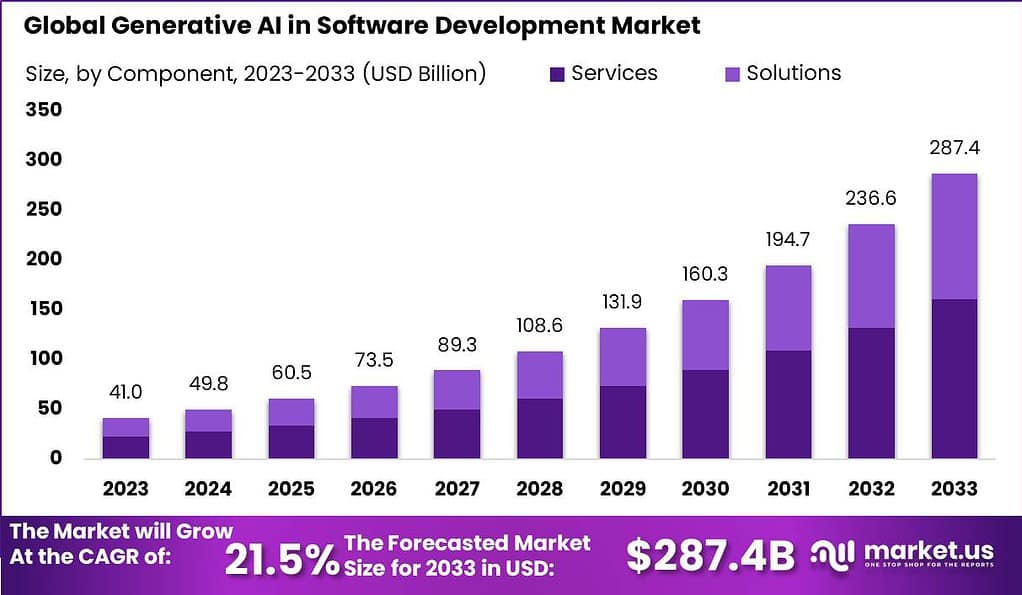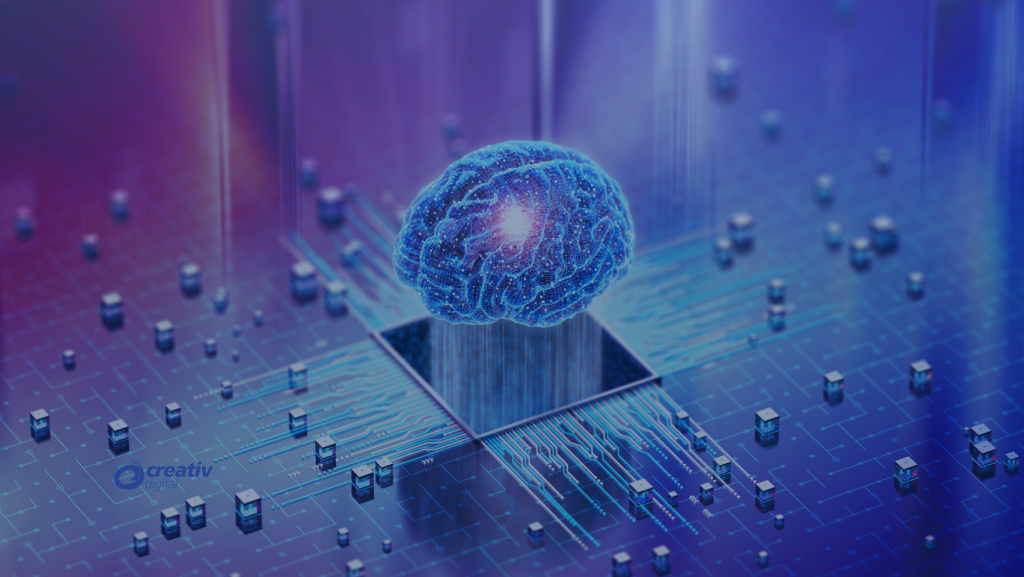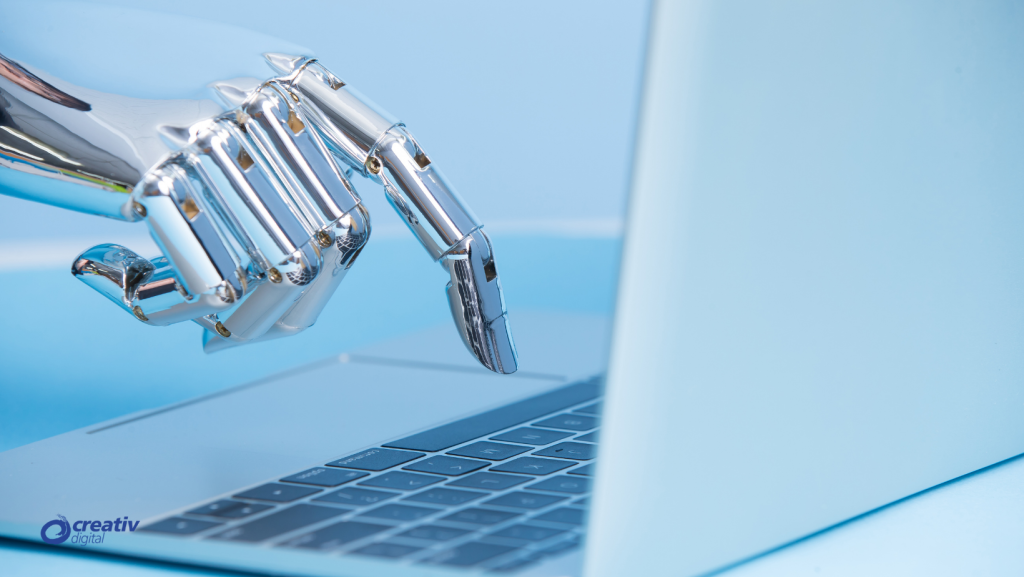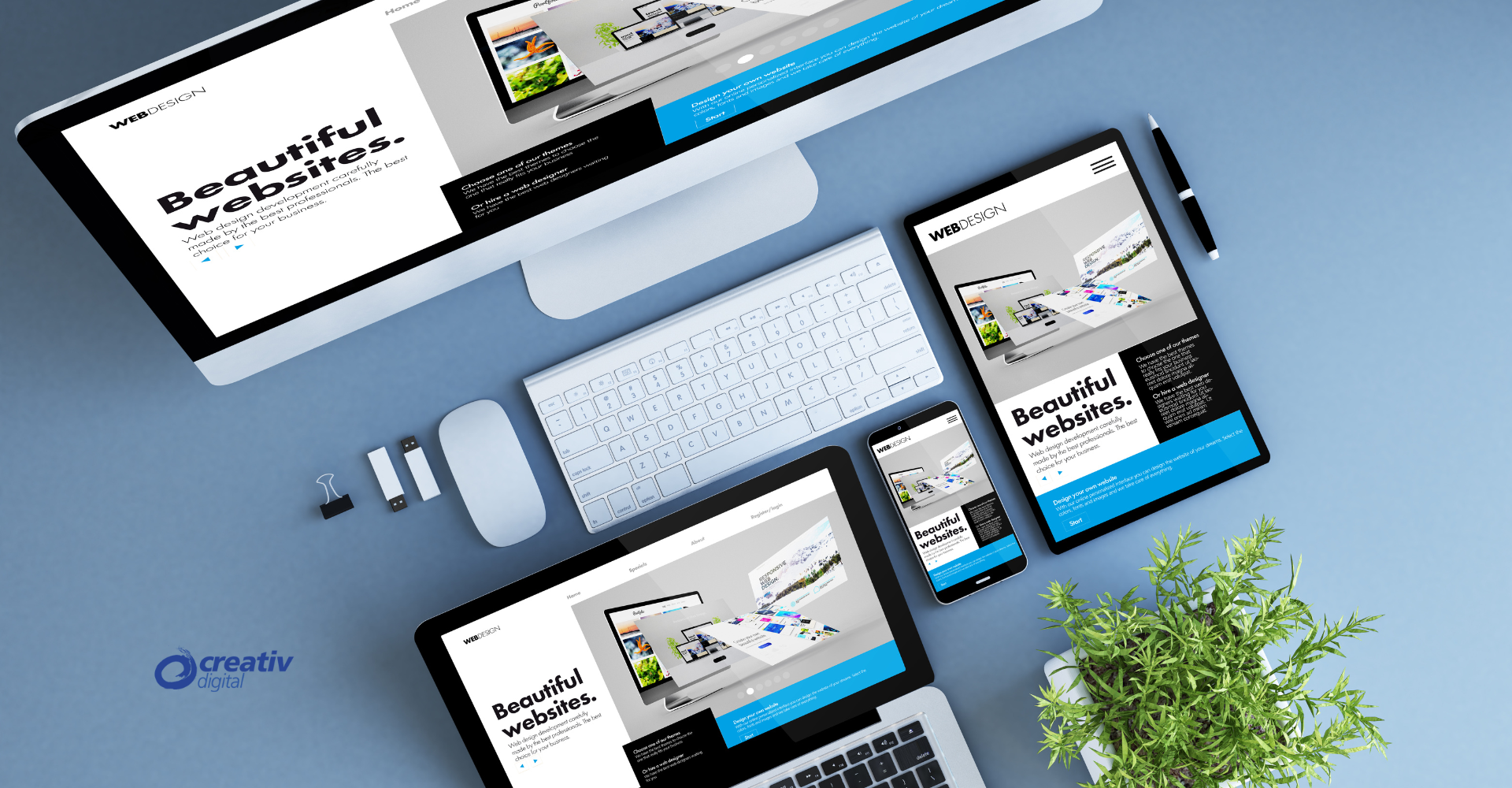Key Takeaways
- AI streamlines workflows, reduces repetitive activities, and lowers costs through automation in development and maintenance.
- 72% of businesses use AI for its transformative potential, with the global AI market projected to hit $243.71B by 2025.
- AI website development automates coding, debugging, and testing, allowing developers to focus on creativity and user-centric strategies.
- Sectors like e-commerce, healthcare, logistics, education, and hospitality leverage AI to optimize functionality and user engagement.
- Innovations like predictive analytics, hyper-personalization, and advanced AI frameworks will drive web development by 2025.

Artificial intelligence has become an integral part of daily lives of both people and businesses, from casual interactions with ChatGPT to leveraging machine learning for innovative digital products. AI in web development gives businesses the ability to create solutions that please users with exceptional functionality and personalized features.
As AI has the power to process vast datasets, deliver precise insights, and support data-driven decisions, 72% of businesses have adopted the technology. Its potential makes it one of the most transformative technologies, with the global AI market expected to reach $243.71B by 2025.
Standing among the prominent AI software developers, Creativ Digital has been harnessing AI’s impressive capabilities, delivering automated solutions and consulting services.
In this post, we will share our insights on adopting AI for web development projects in different industries. Delve into AI’s benefits, features, and applications with our own success cases!
Table of Contents
- What is AI in Web Development?
- Essential AI Web App Features
- Benefits of AI in Web Development
- Industries Leveraging AI in Web Development
- Employing AI for Web Development: Challenges & Limitations
- Future Trends in AI and Web Development
- How Businesses Can Leverage AI for Web Development
- Why Choose Creativ Digital?
What is AI in Web Development?

AI website development involves integrating artificial intelligence technologies to automate various aspects of web development, such as coding, testing, and debugging. This automation allows developers to focus more on creative and strategic tasks, enhancing productivity and efficiency.
Tools like GitHub Copilot and GPT-engineer simplify workflows by generating code, structuring projects, and reducing repetitive tasks. In UX design, AI personalizes user interactions based on behavior, boosting engagement and satisfaction. Its true value lies in analyzing user data to optimize performance, refine layouts, improve navigation, and anticipate user needs, driving better results.
This adoption surge is reflected in the projected growth of the GenAI software market, expected to soar from $60.5B in 2025 to $287.4B by 2033.
Essential AI Web App Features
The use cases of artificial intelligence in web applications vary from product to product, depending on the target user and unique market focus. However, some features have proven successful in popular niches, all of which are designed to deliver custom, secure, automated, and data-driven experiences.
- Personalized User Experience: AI tailors experiences based on browsing behavior and user preferences, enhancing engagement and satisfaction.
- Chatbots & Virtual Assistants for Customer Service: AI-driven chatbots provide real-time support, enhancing customer service and reducing response times.
- Voice Search and Accessibility for Inclusivity: AI-driven voice features enable hands-free interactions, creating a more inclusive digital environment for all users.
- Content Generation and Automation: AI automates content creation, streamlining the process of building MVPs and allowing developers to focus on core functionality.
- Predictive Analytics for User Behavior: AI analyzes user data to anticipate future actions, helping businesses improve customer experience and boost marketing effectiveness.
- AI-driven Security Modules: AI enhances security measures by detecting fraudulent activities in real-time, safeguarding user data and ensuring trust in the platform.
Benefits of AI in Web Development

Artificial Intelligence (AI) has transformed how websites are designed, built, and maintained. Whether you’re optimizing workflows or creating user-centric websites, here’s how AI-based web development drives innovation and efficiency:
- Efficiency and Speed: AI automates time-consuming tasks, such as coding, debugging, and quality assurance, significantly streamlining the web development process.
- Improved User Experience & Enhanced Engagement: AI-powered web apps create dynamic and interactive websites that adapt to user behavior promptly, ensuring a seamless browsing experience.
- Personalization: AI tailors content, recommendations, and user journeys based on individual preferences, improving satisfaction and boosting conversion rates.
- Cost Reduction: AI reduces development and operational costs by automating labor-intensive processes like testing, customer support, and content creation.
- Better Decision-making: AI equips developers and business owners with actionable insights by analyzing large datasets, guiding decisions related to content, design, and optimization strategies.
- Scalability: AI-powered web applications enable scalable architectures that adapt to user growth without sacrificing performance quality.
Industries Leveraging AI in Web Development

By catering to the specific needs of sectors like e-commerce, healthcare, and education, AI enhances functionality, efficiency, and user satisfaction in ways tailored to each field.
- E-commerce: AI enhances personalized shopping experiences by analyzing user preferences and behavior, optimizing pricing strategies, and monitoring market trends.
- Healthcare: AI-driven web development in healthcare improves patient engagement through virtual assistants, personalized health recommendations, and telemedicine app features.
- Logistics and Transportation: AI optimizes real-time tracking, route planning, and inventory management, helping businesses achieve operational efficiency and improve user satisfaction.
- Education: AI in education adapts learning content to student performance, creating an interactive learning environment. Multilingual tools break language barriers, making educational resources accessible globally.
- Real Estate: AI-driven web apps enhance property search functionality by analyzing user preferences and market trends, helping realtors deliver more relevant listings.
- Hospitality: AI streamlines booking processes and offers personalized recommendations for rooms and activities based on user preferences, improving customer satisfaction.
Employing AI for Web Development: Challenges & Limitations

Despite the variety of AI/ML use cases for businesses of all sectors, the adoption of these technologies might not be smooth from the start. However, if you prepare for the common hurdles proactively, you can have a tangible advantage.
- Data Privacy & Intellectual Property Concerns: Integrating AI in web development often requires collecting and processing user data. Ensuring this data is handled securely to protect user privacy is critical, and misuse or breaches can harm reputation.
- Dependency on AI Tools: Relying heavily on AI tools can lead to over-dependence, reducing the team’s ability to work effectively without them. If tools fail, become obsolete, or are restricted due to licensing issues, businesses may face disruptions.
- Ethical Issues: AI-based web development raises ethical questions, such as the fairness of algorithms, bias in personalization, and the impact on human jobs. Developers must ensure that their AI applications align with broader societal values, fostering trust among users and stakeholders.
- Explainability: AI systems, particularly those using machine learning, often function as “black boxes,” making it hard to understand or explain their decisions. This lack of transparency can complicate debugging, impact user trust, and hinder collaboration with non-technical stakeholders.
- Regulatory Compliance: Businesses must adhere to various data protection policies and regulations, accessibility, and AI usage, which vary across regions. Non-compliance can result in fines and legal challenges, making it vital to navigate the evolving regulatory landscape carefully.
Future Trends in AI and Web Development
As AI continues to introduce technologies that improve functionality, efficiency, and user engagement, let’s explore key trends for leveraging AI in web development that will lead the game in 2025.
- Predictive Analysis for User Behavior: In 2025, AI will enhance predictive analysis by using real-time and IoT data to forecast user actions, improving retention and engagement.
- Advanced Personalization Techniques: Websites will adapt in real-time, using AI to tailor layouts, tone, and features to individual users. Evolving virtual assistants will offer context-aware support, creating seamless user experiences and stronger loyalty through hyper-personalization.
- Evolution of AI Frameworks and Tools: Accessible AI web apps will simplify integrating AR/VR and multilingual features. Low-code solutions will also empower teams to innovate, while generative AI transforms design and content creation, ensuring faster and more efficient web development.
How Businesses Can Leverage AI for Web Development

The adoption of AI requires strategic planning and alignment with business objectives. Here’s a structured approach:
- Define Clear Objectives: Start with the discovery phase to establish specific goals, such as improving customer service, optimizing website performance, or automating routine tasks.
- Select Appropriate Tools: Evaluate AI platforms and frameworks that align with your technical requirements and business needs.
- Ensure Data Quality: AI systems depend on accurate and comprehensive data. Invest in data collection and preprocessing to enhance outcomes.
- Develop an MVP: It’s better to first test AI features within a minimum viable product and gather feedback. This will reduce risk and guide future development.
- Address Compliance and Ethics: Allocate resources to establish compliance with data privacy regulations and ethical considerations when implementing AI in web development.
Why Choose Creativ Digital?
Creativ Digital brings extensive 20-year experience in web development, breathing the power of AI in projects of any size and complexity. With a focus on GDPR compliance and ISO-certified practices, we ensure the highest standards of data protection and regulatory alignment.
Whether developing on-demand applications, creating custom software, or modernizing legacy systems, our expert teams integrate advanced algorithms to streamline operations and drive innovation.



